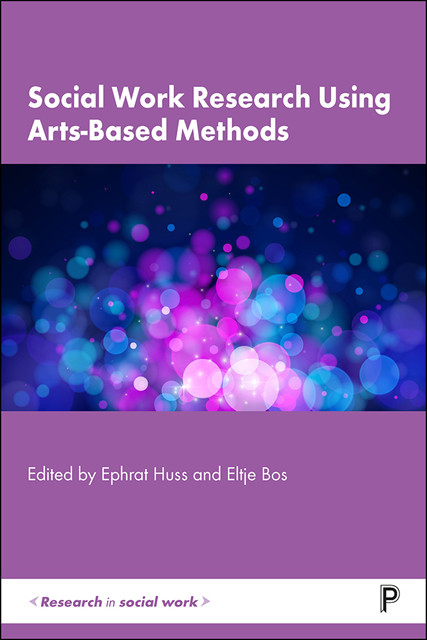Book contents
- Frontmatter
- Dedication
- Contents
- List of figures and tables
- Notes on contributors
- Introduction
- Section I Arts-based research as a method to understand and give voice to marginalised groups
- Section II Using arts-based research to listen to, and give voice to, children in social work
- Section III Arts-based research as a way for researchers and community members to understand communities
- Epilogue
- Index
2 - Arts-and music-based activities and nondeliberative participatory research methods: building connection and community
Published online by Cambridge University Press: 13 October 2022
- Frontmatter
- Dedication
- Contents
- List of figures and tables
- Notes on contributors
- Introduction
- Section I Arts-based research as a method to understand and give voice to marginalised groups
- Section II Using arts-based research to listen to, and give voice to, children in social work
- Section III Arts-based research as a way for researchers and community members to understand communities
- Epilogue
- Index
Summary
Arts exposure and engagement have been used throughout the history of the social work profession, particularly in community-oriented forms of social work and social group work. As one of the leading voices of the settlement house movement, Jane Addams, along with cofounder Ellen Gates Starr, championed the use of the arts at the Chicago-based settlement, Hull House (Glowacki, 2004). This practice lives on today as practitioners, researchers, and scholars argue for the inclusion of arts-and music-based activities in social work practice, education, and research (Huss & Sela-Amit, 2019; Nissen, 2019). While several expressive therapies have grown into substantial fields of practice with bodies of literature to support their efficacy and effectiveness (Malchiodi, 2013), including art, dance, music, and play therapies, these areas of practice tend to focus on micro-level interventions to address behavioural and medical health problems.
There is a small but growing body of literature exploring the use of music-based activities to create opportunities for empowerment (Travis et al., 2019a, 2019b, 2020) and to engage participants’ talents, strengths, and interests (Kelly, 2017, Kelly, 2019). While these studies show that musicbased activities have the power and potential to engage, harness, and foster participants’ strengths, less is known about how these types of activities might be used as nondeliberative participatory research methods to build connection and community, particularly within groups. This chapter will explore this idea, beginning with brief reviews of Norma Lang's (2016) theory of nondeliberative practice and participatory research methods, followed by a case study of a research project I conducted that used audio documentary as a nondeliberative participatory research method. The chapter closes with a reflection and summary of the project and related processes, including lessons learned and implications for future work.
Nondeliberative group work practice
Nondeliberative group work practice considers and incorporates ‘artful, actional and analogic forms of solution-seeking’ (Lang, 2016, p. 103) in order to stimulate group members conative styles of engagement and problem solving. A key distinction of nondeliberative practice, is to ‘do, then think’ (p. 101), with activity serving as a catalyst for the unfolding group process. In previous archival work, a coauthor and I reviewed the use of arts-and music-based activities during the recreation movement, the settlement house movement, mid-20th century social group work, and contemporary social work practice (Kelly & Doherty, 2016, 2017).
- Type
- Chapter
- Information
- Social Work Research Using Arts-Based Methods , pp. 24 - 32Publisher: Bristol University PressPrint publication year: 2022



